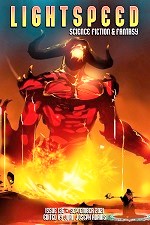 Lightspeed #136, September 2021
Lightspeed #136, September 2021
“Judi” by Adam-Troy Castro
“Where You Left Me” by Thomas Ha
“Mister Dawn, How Can You Be So Cruel?” by Violet Allen (reprint, not reviewed)
“The Revolution Will Not Be Served with Fries” by Meg Elison
“Fanspell: Flowers in Spring (RobYung, NSFW)” by Anya Ow
“Invasive Species and their Habitats” by Alexander Weinstein (reprint, not reviewed)
“Sía” by Lizz Huerta
“It Begins to Snow” by Adam R. Shannon
Reviewed by Victoria Silverwolf
This issue begins and ends with flash fiction that reads like poetry, with four new full-length stories between these tidbits.
The narrator of “Judi” by Adam-Troy Castro loses a loved one to death on an alien world. Journeying through space for an immense amount of time, the narrator comes to realize that escape from the memory is impossible.
This very brief tale has emotional appeal, but a certain vagueness reduces its effect. The two characters are not described in any way. (The name in the story’s title does not occur anywhere in the text.) Although the setting is a universe of tens of thousands of inhabited worlds, the background is left undeveloped.
In “Where You Left Me” by Thomas Ha, human colonists battle the alien inhabitants of a distant planet. By ingesting an addictive, hazardous substance, they are able to perceive possible futures, allowing them to fire their weapons at the aliens with deadly accuracy. The narrator drinks the substance outside of battle as well, weakening his relationship with his young son.
The premise is an apparent allegory for substance abuse. (The way in which the narrator hides bottles of the substance suggests alcoholism.) Mixed with this is a possible anti-colonialism message, with the humans battling the aliens on their native world. From the viewpoint of plot logic, one has to wonder why the humans are here at all, given the planet’s inhospitable environment and dangerous indigenous inhabitants. Without giving too much away, the way in which the addictive substance is obtained raises a sort of chicken-and-egg situation, which seems unlikely.
“The Revolution Will Not Be Served with Fries” by Meg Elison paints a grim picture of working at a fast food restaurant in the near future. The employees have money deducted from the paychecks, and even lose their jobs, for very minor failures to perform perfectly. The company secretly controls many aspects of their lives and futures. A possibility of escaping from this drudgery arrives in an unexpected way.
The author vividly portrays the desperation of people laboring at an unappreciated, wearisome, poorly paid job. (The story’s political stance is strongly pro-union, with a fierce denunciation of corporate abuses.) The melodramatic event that leads to the climax is less convincing.
“Fanspell: Flowers in Spring (RobYung, NSFW)” by Anya Ow takes place in a fantasy world with magic-using clerics, but one in which a supernatural version of the Internet closely resembles what exists in our own reality. Admirers of the clerics write fanfiction about their favorites, and even experiment with unauthorized spells spread through social media. The plot involves a spell that leads to accidental deaths, as well as the secretive way in which women, discouraged from becoming clerics, learn to use magic on their own.
Readers unfamiliar with the culture of fanfiction may not be able to fully appreciate the story. Those who are, on the other hand, may find the imaginary version too close to the real one. The use of a very modern, computer-oriented term like “doxx” draws one out of the fantasy world completely. The author’s attitude about social media seems to be ambiguous, acknowledging its dangers while promoting its ability to empower the disenfranchised. (In this case, women, giving the work a feminist perspective.)
The narrator of “Sía” by Lizz Huerta contacts a New Age style spiritual guide after the death of a close friend. After witnessing the inappropriate use of traditions outside the guide’s culture, the narrator communicates with the spirits of her ancestors, reaching far back into prehistory. It leads to an out-and-out battle between the spirits of oppressors and the oppressed.
This synopsis fails to convey the story’s frequent use of humor, although it has serious aspects as well. The narrator is something of a smart aleck, and the spirits of her ancestors are a rowdy lot. The story has a great deal of political content, the narrator describing herself as following the “radical queer feminist, anti-colonial, anti-imperialist, indigenous rights path.” In particular, satire is used to speak out against cultural appropriation. How readers feel about these issues may determine the way they react to this work.
The magazine ends on a quiet, poetic note with the very short story “It Begins to Snow” by Adam R. Shannon. Unending snowfall, apparently wished into existence by one of the characters, threatens to bring the end of the world, but not all is lost. The sense of cold is vividly conveyed, but, like the first story, a sense of vagueness lessens the impact.
Victoria Silverwolf got a flat tire on the way to work tonight.